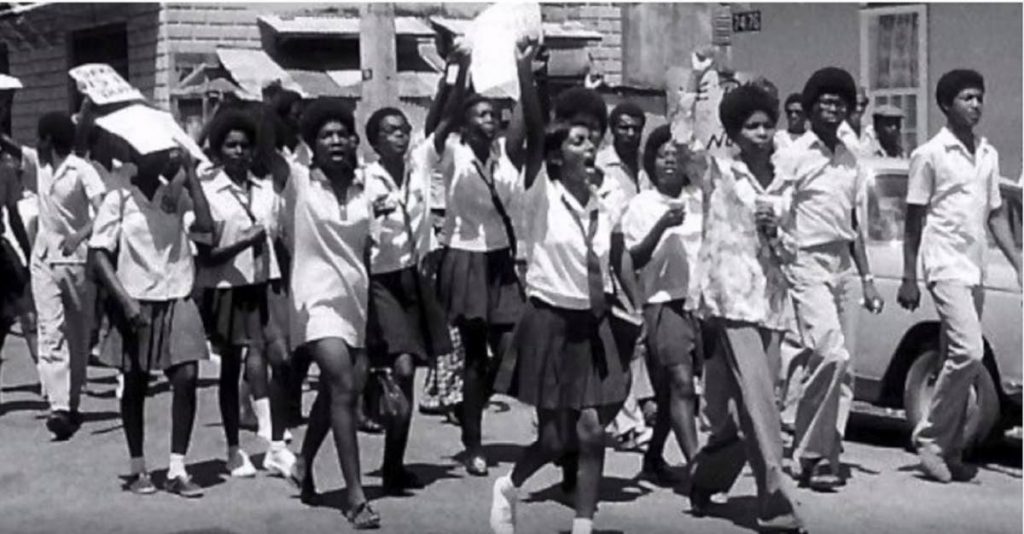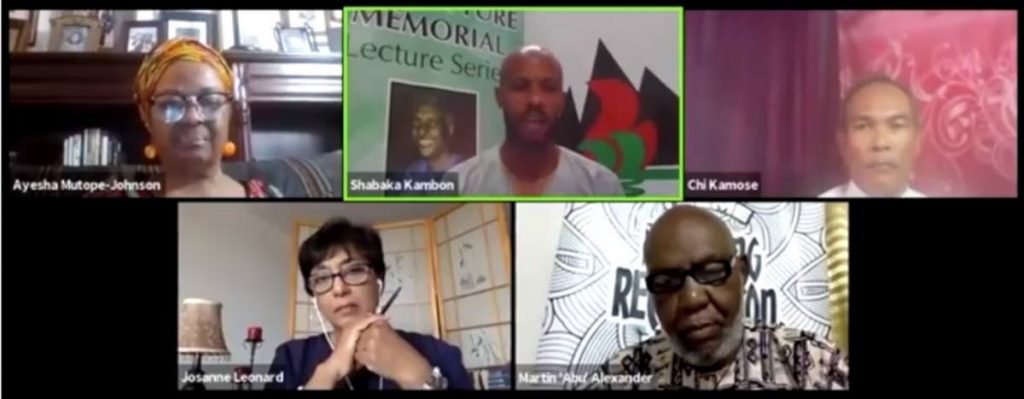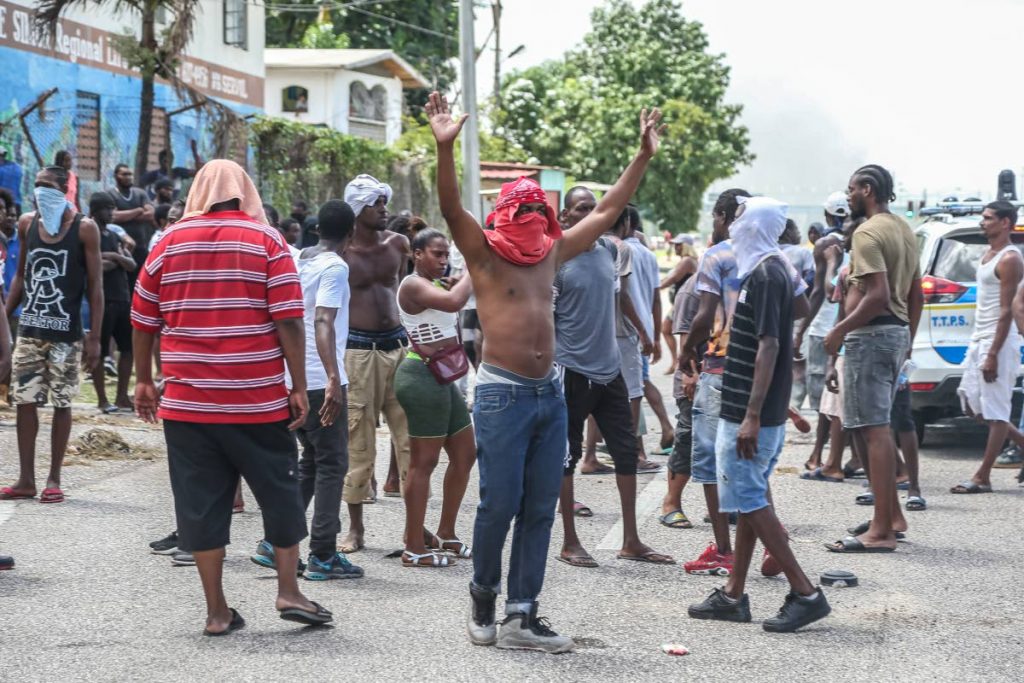Students get on radical in 1970

In 1970, all the students of a form five class of Woodbrook Secondary School were suspended. Their offence? They were “radicalised” by the protests of the Black Power Movement sweeping TT.
They were angry about inequalities in the school system and the movement’s call to action against social injustice, including police brutality, attracted them as it had hundreds of students, ages 14 to 18, in other schools.
A loose grouping of students evolved into the National Organisation of Revolutionary Students (NORS), the precursor to today’s National Youth Action Committee (NYAC) – the youth arm of the National Joint Action Committee (NJAC).
Four NORS founding members came together on a panel hosted in early July by the Emancipation Support Committee of TT, titled Student Revolutionaries of the 1970 Black Power Movement.
The panellists were independent consultant Josanne Leonard; Caribbean Historical Society director Martin “Abu” Alexander; Social Development and Family Services Ministry change management officer Chi Kamose; and lawyer Ayesha Mutope-Johnson.

Most of the panellists were exposed to radicalism through their parents, most of whom were members of the NJAC. Some were drawn to the movement through wanting to improve the conditions they lived in. NORS was integral to the holding of the Chaguaramas Conference on Secondary Education chaired by the prime minister Dr Eric Williams and the eventual creation of the Caribbean Examinations Council (CXC).
Relating the protests then to the Black Lives Matter movement today, moderator Shabaka Kambon said there was now a large cross-section of races in the protests, where previously the struggle for racial justice was seen as illegitimate. He asked the panel what they thought caused the change.
Alexander said technology was a major factor in enabling people to see what was happening, especially with the police killing of George Floyd, an African-American man, in May.
Even, videos on social media relating to the June 25 police killings of three men in Morvant, had a similar effect and led to the east Port of Spain protests, two days later.
Mutope-Johnson said globally the conscious participation of English-speaking white people who realised there was a problem was what lent critical mass to the protests.
“Lots of African-Americans were brutalised and no-one took it on, but with Floyd it was broadcast live and they could not ignore the brutality. Similarly in Trinidad with the shootings in Morvant, if the videos weren’t released, it’s the immediacy of seeing the thing that fired up people’s sense of injustice. In countries like ours, where we have black leadership, we have to say poor black lives matter and appeal to people’s sense of decency to see that disenfranchisement means being left out and left behind.”
Leonard said this sense of conscience being pricked was wonderful, but unless sympathisers and allies were willing to confront the systemic issues that lie at the core of police brutality, it doesn’t mean much. She said the issue of reparations for African people has not been addressed. She said those who benefit from white privilege have to take the conversation beyond marches and realise they have lived lives that have benefited from the eradication of black people’s history.

Leonard said she cried when she saw the protests in Port of Spain and her feelings then morphed to anger. She said the society has so much inequity and the residents of the underserved communities live in a gentrified shanty town.
“We have preserved for them the feeling that they eke out a living from the landfill/labasse. We are living in a drug economy. People have cleaned themselves up but they have not been presented with opportunities for education.
Kamose said when white people join the struggle, they water it down. He said more social education was needed to encourage people to have pride and self-confidence. He said governments of the day provide schools and teachers, but the children have no nourishment when they go home.
“Many times we condemn our parents, but the way the society is organised, they have to work two or three jobs a day so can’t help, and are also children themselves. We dismiss these conditions, but we need different state agencies to up their ante. We need to address these issues in our communities, thousands of children go to school in the same conditions I did then, we need to do better.”
The panel said the work being done by young people today has to be recognised, along with how the issue of classism affects this work. They said they did the work in their time but the struggle continues. They said covid19 has shown even more glaringly the gross inequities that exist in TT.
The story of NORS
Leonard said when NORS came into fruition, there was no NJAC leadership.
“It is often forgotten that there was a second state of emergency in 1971. The thing that brought us together was the Free the Soldiers campaign. Soldiers took a position that they would not allow themselves to be used to open fire on protesters. Raffique Shah and others took a conscious decision to not be used as firepower against the citizens in the country.”
Alexander said the secondary schools were hurriedly built following Dr Eric Williams’ statement about the future of the nation being in children’s bookbags, and some were built on market and city council land because there wasn’t enough space for them. He said there was a shortage of staff to teach many subjects and there was discussion by the students about the inadequacy of the teachers.
He said a newly instituted lecture series at Woodbrook Secondary dealt with issues of Black Power, the Vietnam War and other topical issues and the staff became anxious about students being radicalised. He said students were banned from certain classrooms and the whole fifth form was suspended.
He said at that point, students came out in protest in solidarity, some of who were arrested and taken to the Woodbrook Police Station where they were terrorised by the police.
“We went through physical and mental torture, Constable Duke played Russian roulette with some of the students. We had a terrible time.”
Leonard said there wasn’t a definitive point at which NORS dissolved. She said what happened to NORS, NJAC and the progressives was a consequence of what happened in the country.
“We went into the oil boom, (Prime Minister Eric) Williams started to use the language of the revolution and doing what the movement wanted. Some of the protesters and militants began agitating for other causes.”
Alexander said the representatives from Woodbrook Secondary and similar schools did not attend the Chaguraramas education conference with Williams as they did not think he would take them on.
“We sent our ideas with members of prestige schools that were NORS members, and a number of the recommendations were taken on board. That’s how we got comprehensive schools with trade. There were also private schools that had closed down arbitrarily, and we marched and got the education ministry to take them in and let them take exams.”
Kamose said NORS tried to form a Caribbean organisation of revolutionary students and travelled to different Caribbean countries to do so.
“NORS had its own publication. We talked to students about education and what type they needed to engage in. We let them know that politics was not just for the adults. As part of that, NORS helped develop TT without using the public purse. Eventually it morphed into NYAC and the struggles continued.”


Comments
"Students get on radical in 1970"